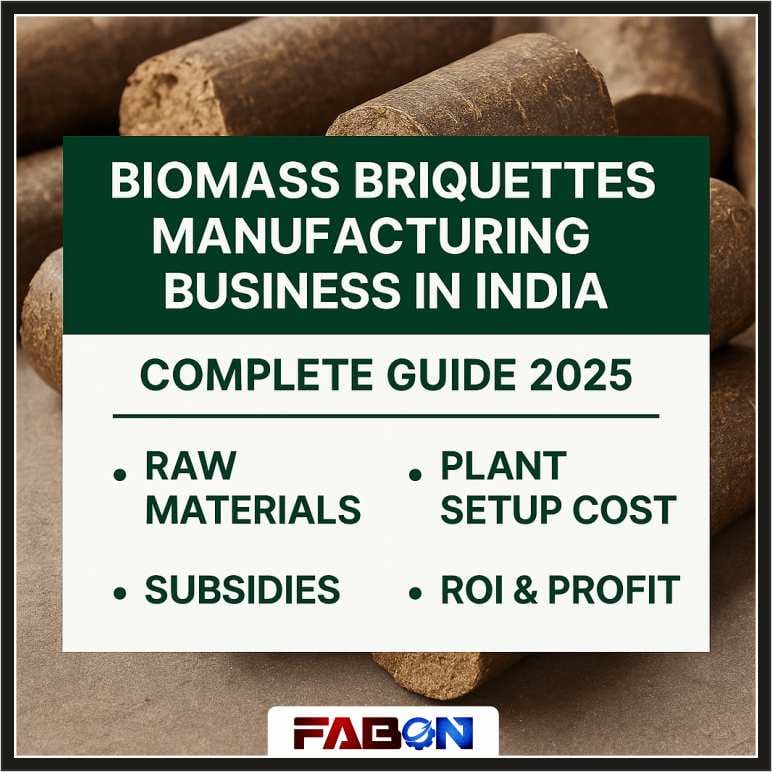Biomass Briquettes – Complete Guide 2025 | Raw Material, Plant Setup, Subsidies, ROI & Profit

Meta Title: Biomass Briquettes Business – Raw Material, Setup, Subsidy, ROI & Profit (2025)
Meta Description: Start a biomass briquette manufacturing business in India. Learn about raw materials, plant setup, government subsidies, ROI, maintenance, and profit per kg.
1. Introduction – What are Biomass Briquettes?
Biomass briquettes are eco-friendly, high-energy fuel blocks made from agricultural and forestry waste. They are an excellent alternative to coal, diesel, and LPG for industrial boilers, brick kilns, thermal power plants, and commercial heating applications.
With increasing fossil fuel costs and strict pollution norms, biomass briquettes are gaining popularity as a carbon-neutral, renewable energy source.
2. Raw Materials for Biomass Briquettes
Biomass briquettes can be made from various agro-waste and forestry residues, depending on availability in your region.
Common raw materials include:
- Agricultural Residues: Rice husk, groundnut shells, sugarcane bagasse, cotton stalk, soybean husk, mustard husk.
- Forestry Waste: Sawdust, wood shavings, bark, leaves, twigs.
- Agro-Industrial Waste: Coffee husk, coir pith, maize cobs, wheat husk, tobacco waste.
Pro Tip: Select raw materials with low moisture (<12%) and high calorific value (GCV) for better briquette quality.
3. Required Land & Establishment Place
For a small-to-medium biomass briquette plant:
- Land Area: 2,000–5,000 sq. ft. (for 300–1000 kg/hr capacity)
- Location: Near raw material source (to reduce transport costs) and with good road connectivity.
- Infrastructure:
- Covered shed for machinery & storage
- Open space for raw material drying
- Electrical connection (3-phase, adequate load)
4. Machinery & Equipment
A typical briquette manufacturing plant requires:
- Briquetting Press Machine (Screw press or piston press)
- Crusher / Hammer Mill (for size reduction)
- Dryer (if raw material moisture >12%)
- Conveyors
- Packing machine (optional for retail market)
Example: FABON Biomass Briquetting Plant offers fully automated solutions with 1–10 TPH capacity and ISO 9001:2015 certified quality.
5. Government Subsidies & Financial Support (India – 2025 Update)
The Indian government supports biomass energy projects through:
- MNRE (Ministry of New & Renewable Energy) – Capital subsidy up to 20–30% for biomass briquetting plants.
- State Renewable Energy Departments – Additional incentives in states like Maharashtra, Gujarat, Haryana, Punjab.
- Bank Loans under Priority Sector – Up to 80% project cost with low-interest rates.
- GST Benefits – Biomass briquettes attract only 5% GST (HSN 4401).
6. Investment & Costing
Approximate Plant Setup Cost (1 TPH Capacity):
- Machinery & equipment: ₹20–35 Lakhs
- Civil works & shed: ₹5–10 Lakhs
- Electrical & installation: ₹2–5 Lakhs
- Working capital: ₹5–10 Lakhs
Total: ₹32–60 Lakhs (depending on capacity & automation level)
7. ROI & Profitability
Example Calculation – 1 TPH Briquetting Plant
- Production: 8 tons/day (8 hrs shift)
- Selling Price: ₹6.5 – ₹8.5 per kg (industrial market)
- Raw Material Cost: ₹3.5 – ₹5 per kg
- Gross Profit: ₹2 – ₹3 per kg
- Daily Profit: ₹16,000 – ₹24,000
- Monthly Profit: ₹4.5 – ₹6.5 Lakhs
- ROI Period: 8–12 months (with consistent raw material supply)
8. Maintenance & Operational Tips
To ensure long life and consistent output:
- Regular lubrication of press machine
- Timely replacement of wear parts (dies, screws, pistons)
- Maintain proper moisture content in raw material
- Clean conveyors and dust collectors to avoid blockages
- Keep spare parts inventory to avoid downtime
9. Environmental & Economic Benefits
- Reduces air pollution & deforestation
- Utilizes agro-waste efficiently
- Cuts down industrial fuel costs by 40–60%
- Generates rural employment
- Eligible for Carbon Credit Trading
10. Conclusion – Why Start a Biomass Briquette Business in 2025?
The demand for clean, renewable, and cost-effective fuels is growing rapidly in India and abroad. With government subsidies, low operating costs, and strong market demand, a biomass briquette plant is a profitable and sustainable business opportunity.
FABON Engineering Pvt. Ltd. offers complete turnkey biomass briquetting solutions, from design to installation, with after-sales service and 1-year warranty.

